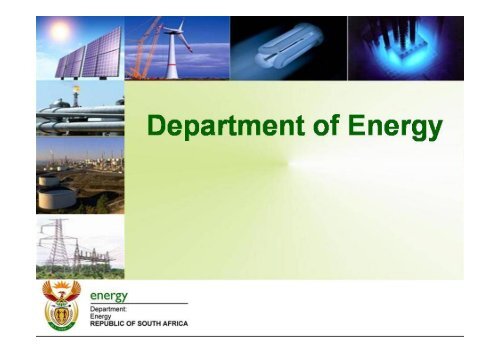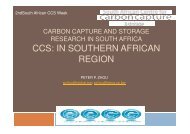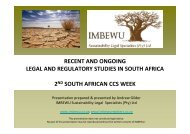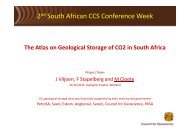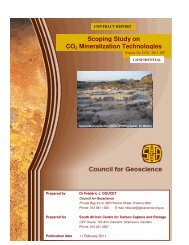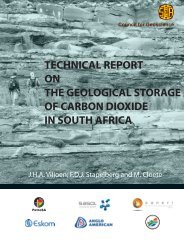CCS legal and regulatory activity in South Africa - South African ...
CCS legal and regulatory activity in South Africa - South African ...
CCS legal and regulatory activity in South Africa - South African ...
You also want an ePaper? Increase the reach of your titles
YUMPU automatically turns print PDFs into web optimized ePapers that Google loves.
<strong>CCS</strong> <strong>legal</strong> <strong>and</strong><br />
<strong>regulatory</strong> <strong>activity</strong> <strong>in</strong><br />
<strong>South</strong> <strong>Africa</strong><br />
Mr. L<strong>and</strong>i Themba<br />
Director: Coal <strong>and</strong> Gas Policy<br />
Tel : 012 444 4047<br />
E-mail: L<strong>and</strong>i.Themba@energy.gov.za
Presentation outl<strong>in</strong>e<br />
•Introduction<br />
•SA <strong>CCS</strong> Plans<br />
•<strong>CCS</strong> <strong>legal</strong> <strong>and</strong> <strong>regulatory</strong> <strong>activity</strong> <strong>in</strong> <strong>South</strong><br />
<strong>Africa</strong>/World bank <strong>CCS</strong> Trust Fund<br />
•Other <strong>CCS</strong> activities to support the<br />
development of <strong>legal</strong> <strong>and</strong> <strong>regulatory</strong><br />
frameworks <strong>in</strong> <strong>South</strong> <strong>Africa</strong><br />
•Conclusion
BACKGROUND 1<br />
• <strong>South</strong> <strong>Africa</strong> has a coal based economy<br />
Coal resources estimate – 140 Gt ; Coal reserves – 33 Gt<br />
Fossil fuel contributes 89.2 % as a primary energy resource<br />
As profile of energy mix, Coal represents 65.5% of primary<br />
energy source, followed by Oil (25.3 %), Gas (2.8%) <strong>and</strong> the<br />
balance sourced from nuclear <strong>and</strong> renewable Energy<br />
Coal is a primary feedstock for almost 90 % of total electricity<br />
generation , <strong>and</strong> contributes approximately 30% <strong>in</strong> total liquid<br />
fuels through Coal To Liquid Technology<br />
• Accord<strong>in</strong>g to the United Nation Framework Convention on<br />
Climate Change UNFCCC, <strong>South</strong> <strong>Africa</strong> emits almost 400 Mt CO 2<br />
annually, <strong>and</strong> is ma<strong>in</strong>ly from electricity <strong>and</strong> Syn-fuel <strong>in</strong>dustry.
BACKGROUND 2<br />
• <strong>South</strong> <strong>Africa</strong> is committed to management of efficient use of its coal<br />
through employment of Clean Coal Technology like carbon capture<br />
<strong>and</strong> storage for stabilisation of CO 2<br />
• This is demonstrated by the country’s Integrated Resources Plan<br />
(IRP) 2010 which recognises the importance of cont<strong>in</strong>ued use of coal<br />
<strong>in</strong> a responsible manner through employ<strong>in</strong>g CCT, while phas<strong>in</strong>g <strong>in</strong><br />
renewable energy<br />
• Dur<strong>in</strong>g Conference of Parties (COP 15) <strong>in</strong> Copenhagen, president<br />
Zuma announced target on CO2 emission reduction by 34% <strong>in</strong> 2020<br />
<strong>and</strong> 42% <strong>in</strong> 2025, subjected to technical, f<strong>in</strong>ancial <strong>and</strong> capacity<br />
support from develop<strong>in</strong>g countries.<br />
•<strong>South</strong> <strong>Africa</strong> is <strong>in</strong>vestigat<strong>in</strong>g Carbon Capture <strong>and</strong> Storage as one of the<br />
potential tools to limit greenhouse gas emissions.
Introduction<br />
<strong>South</strong> <strong>Africa</strong> is <strong>in</strong>vestigat<strong>in</strong>g Carbon Capture <strong>and</strong> Storage as one<br />
of the potential tools to limit greenhouse gas emissions.<br />
The <strong>South</strong> <strong>Africa</strong>n Centre for Carbon Capture <strong>and</strong> Storage<br />
(SAC<strong>CCS</strong>) has developed a roadmap for carbon dioxide capture <strong>and</strong><br />
storage to ensure successful implementation of <strong>CCS</strong> activities <strong>in</strong><br />
<strong>South</strong> <strong>Africa</strong> but the implementation of <strong>CCS</strong> requires a sound<br />
legislative framework as a base.<br />
<strong>South</strong> <strong>Africa</strong> does not have a <strong>CCS</strong>-specific regulations<br />
There are pieces of legislations that can be amended to support<br />
<strong>CCS</strong> as <strong>CCS</strong>-specific regulations still need to be developed<br />
This phenomenon is not unique to <strong>South</strong> <strong>Africa</strong>, s<strong>in</strong>ce <strong>CCS</strong><br />
technology is novel most countries that are lead<strong>in</strong>g <strong>in</strong> <strong>CCS</strong> began<br />
with employ<strong>in</strong>g exist<strong>in</strong>g legislation with amendments to meet <strong>CCS</strong><br />
requirements viz. Norway, Brita<strong>in</strong>, US, Australia <strong>and</strong> others.
Regulations <strong>and</strong> M<strong>in</strong>eral resources<br />
Historically countries have been develop<strong>in</strong>g, review<strong>in</strong>g <strong>and</strong><br />
amend<strong>in</strong>g the legislative <strong>and</strong> <strong>regulatory</strong> frameworks that addresses<br />
m<strong>in</strong>eral resources, with requirement or criterion to qualify for m<strong>in</strong><strong>in</strong>g<br />
rights, permits <strong>and</strong> licenses. This is regarded as exploitation <strong>and</strong><br />
extraction of m<strong>in</strong>erals<br />
The concept of carbon capture <strong>and</strong> storage is a reserve<br />
mechanism of conventional m<strong>in</strong><strong>in</strong>g processes, <strong>in</strong>troduc<strong>in</strong>g materials<br />
or substances <strong>in</strong> the ground <strong>in</strong>stead of remov<strong>in</strong>g them <strong>and</strong> hence<br />
dem<strong>and</strong>s adjustment of current <strong>regulatory</strong> framework.<br />
Accord<strong>in</strong>g to M<strong>in</strong>erals <strong>and</strong> Petroleum Resources <strong>and</strong><br />
Development Act, all m<strong>in</strong>erals belong to the state, when we<br />
<strong>in</strong>troduce CO 2 to the ground, possibly form<strong>in</strong>g calcite m<strong>in</strong>erals on<br />
contact with metal oxides, does that signify transformation of<br />
responsibility to the state ?
Regulations <strong>and</strong> Carbon dioxide<br />
M<strong>in</strong><strong>in</strong>g as well as <strong>CCS</strong> has a probability of negative impact to the<br />
environment that should be managed, which constitute a liability to those<br />
responsible eg. Acid m<strong>in</strong>e dra<strong>in</strong>age. Some m<strong>in</strong>es were ab<strong>and</strong>oned,<br />
ownerless <strong>and</strong> derelict <strong>and</strong> liquidated hence constitute permanent liability to<br />
the state. What about <strong>CCS</strong> liabilities now <strong>and</strong> <strong>in</strong> future?<br />
S<strong>in</strong>ce CO2 sources <strong>in</strong> <strong>South</strong> <strong>Africa</strong> are faraway from <strong>in</strong>jection po<strong>in</strong>ts or<br />
s<strong>in</strong>ks, that will <strong>in</strong>volve transportations of CO2 through pipel<strong>in</strong>es, tankers<br />
either gas or liquefied carbon dioxides, transportation costs <strong>in</strong>clud<strong>in</strong>g tariffs,<br />
etc dem<strong>and</strong> <strong>regulatory</strong> framework.<br />
Carbon dioxide need to be def<strong>in</strong>ed as a waste for disposal or a<br />
commodity for down stream m<strong>in</strong>eral beneficiation for commercial or profit<br />
generat<strong>in</strong>g projects, the latter talks to CCUS that is aggressively driven by<br />
Ch<strong>in</strong>a.
<strong>CCS</strong> Interdepartmental Task Team<br />
<strong>South</strong> <strong>Africa</strong> is <strong>in</strong> the process of establish<strong>in</strong>g a <strong>CCS</strong><br />
Interdepartmental Task Team, which will be <strong>in</strong>augurated shortly.<br />
There are six relevant departments <strong>in</strong>volved which <strong>in</strong>clude<br />
Energy, M<strong>in</strong>eral Resources <strong>and</strong> Environmental Affairs.<br />
The po<strong>in</strong>ts of discussion <strong>and</strong> challenges on <strong>CCS</strong> <strong>regulatory</strong><br />
framework <strong>in</strong> the previous slides, shows that <strong>CCS</strong> is a cross<br />
cutt<strong>in</strong>g issue <strong>and</strong> will need synergy, cooperation, coord<strong>in</strong>ation<br />
<strong>and</strong> participation of relevant departments to work collectively<br />
on <strong>CCS</strong> matters.
<strong>CCS</strong> Roadmap <strong>in</strong> <strong>South</strong> <strong>Africa</strong><br />
•<strong>South</strong> <strong>Africa</strong> plans to have the CO2 Test Injection <strong>in</strong> 2016<br />
•<strong>CCS</strong> Demonstration plant <strong>in</strong> 2020<br />
•<strong>CCS</strong> Commercial operation <strong>in</strong> 2025<br />
•Preparatory work is required to enable successful<br />
implementation of the test <strong>in</strong>jection <strong>and</strong> other future <strong>CCS</strong><br />
operations<br />
•The country is currently tak<strong>in</strong>g steps to facilitate the<br />
implementation of <strong>CCS</strong>
<strong>CCS</strong> Legal <strong>and</strong> Regulatory<br />
activities underway <strong>in</strong> <strong>South</strong> <strong>Africa</strong><br />
The World Bank has approved a fund<strong>in</strong>g of $1.2 million dollars<br />
towards <strong>CCS</strong> activities <strong>in</strong> <strong>South</strong> <strong>Africa</strong> over a period of two years.<br />
The fund will be directed <strong>in</strong> the follow<strong>in</strong>g <strong>CCS</strong> activities:<br />
Development of <strong>CCS</strong> Regulatory Framework.<br />
identify of storage sites <strong>and</strong> smaller-scale projects that would<br />
ascerta<strong>in</strong> technological reliability <strong>and</strong> cost efficiency of <strong>CCS</strong>,<br />
build<strong>in</strong>g on work already be<strong>in</strong>g undertaken <strong>in</strong> <strong>South</strong> <strong>Africa</strong>;<br />
Risk assessment of long-term leakage of CO2, <strong>in</strong>clud<strong>in</strong>g<br />
assessment of possible collateral damage that could result from<br />
such leakage; <strong>and</strong><br />
Assess<strong>in</strong>g global knowledge Base of <strong>CCS</strong> technology;
<strong>CCS</strong> Legal <strong>and</strong> Regulatory activities<br />
underway <strong>in</strong> <strong>South</strong> <strong>Africa</strong> cont.<br />
The DoE/World Bank/SAC<strong>CCS</strong>/<strong>South</strong> <strong>Africa</strong> work<strong>in</strong>g <strong>in</strong> collaboration to<br />
review the current legislative system <strong>in</strong> order to assess the framework<br />
for <strong>CCS</strong> regulation, tak<strong>in</strong>g <strong>in</strong>to consideration other studies that have<br />
already been carried out.<br />
Deliverables: One of the deliverables is a <strong>CCS</strong> conceptual policy<br />
framework, mak<strong>in</strong>g specific allowance for <strong>CCS</strong> under the current<br />
legislative regime that would enable successful implementation of the<br />
Test Injection <strong>and</strong> further development of <strong>CCS</strong> operations <strong>in</strong> <strong>South</strong><br />
<strong>Africa</strong>.
Other <strong>CCS</strong> activities to support the development<br />
of <strong>legal</strong> <strong>and</strong> <strong>regulatory</strong> frameworks <strong>in</strong> <strong>South</strong> <strong>Africa</strong><br />
The IEA/ DoE/SAC<strong>CCS</strong> hosted a <strong>CCS</strong> <strong>legal</strong> <strong>and</strong> <strong>regulatory</strong><br />
workshop <strong>in</strong> Johannesburg on 7 April 2011. The am of the workshop<br />
was to provide an update on the current status of <strong>CCS</strong> <strong>legal</strong> <strong>and</strong><br />
<strong>regulatory</strong> developments <strong>in</strong> <strong>South</strong> <strong>Africa</strong> <strong>and</strong> globally, <strong>and</strong> to identify<br />
next steps for <strong>South</strong> <strong>Africa</strong>.<br />
Workshop recommendations :<br />
The DoE establish an Inter-departmental Task Team to advance<br />
<strong>CCS</strong> <strong>legal</strong> <strong>and</strong> <strong>regulatory</strong> framework development <strong>in</strong> <strong>South</strong> <strong>Africa</strong>, to<br />
be supported by an Advisory Committee made up of key <strong>South</strong><br />
<strong>Africa</strong>n <strong>CCS</strong> stakeholders <strong>and</strong> <strong>in</strong>ternational experts.
Other <strong>CCS</strong> activities to support the development of<br />
<strong>legal</strong> <strong>and</strong> <strong>regulatory</strong> frameworks <strong>in</strong> <strong>South</strong> <strong>Africa</strong><br />
cont.<br />
The DoE produce a discussion paper, for<br />
consideration by the Inter-departmental Task Team<br />
<strong>and</strong> Advisory Committee, sett<strong>in</strong>g out proposed<br />
milestones for <strong>CCS</strong> framework development <strong>in</strong><br />
<strong>South</strong> <strong>Africa</strong>.<br />
The Inter-departmental Task Team to engage with<br />
The Inter-departmental Task Team to engage with<br />
the IEA, particularly around the pr<strong>in</strong>ciples presented<br />
<strong>in</strong> IEA Carbon Capture <strong>and</strong> Storage Model<br />
Regulatory Framework, to <strong>in</strong>form <strong>CCS</strong> framework<br />
development <strong>in</strong> <strong>South</strong> <strong>Africa</strong>.
Other <strong>CCS</strong> activities to support the development of<br />
<strong>legal</strong> <strong>and</strong> <strong>regulatory</strong> frameworks <strong>in</strong> <strong>South</strong> <strong>Africa</strong><br />
cont.<br />
The World Bank <strong>CCS</strong> held a Workshop on 31<br />
May 2011 – 01 June 2011 on the Perspective for<br />
the <strong>South</strong>ern <strong>Africa</strong>n Region.<br />
The ma<strong>in</strong> purpose of the workshop was to<br />
support capacity build<strong>in</strong>g <strong>in</strong> the <strong>South</strong>ern <strong>Africa</strong><br />
region develop<strong>in</strong>g countries.
Conclusion<br />
It is the responsibility of government to develop legislative<br />
framework on <strong>CCS</strong>, to ensure a safe <strong>and</strong> secure operation<br />
<strong>and</strong> implementation of <strong>CCS</strong>.<br />
<strong>CCS</strong> is a crosscutt<strong>in</strong>g issue on the <strong>South</strong> <strong>Africa</strong>n<br />
government departments. The established government<br />
<strong>in</strong>terdepartmental task team is important for <strong>in</strong>tegrated<br />
development of <strong>CCS</strong> <strong>and</strong> the creation of a common<br />
underst<strong>and</strong><strong>in</strong>g <strong>and</strong> shared government policy position.<br />
<strong>CCS</strong> <strong>regulatory</strong> uncerta<strong>in</strong>ty has the potential to stifle<br />
development <strong>and</strong> deployment <strong>CCS</strong>, particularly <strong>in</strong> projects<br />
that have no oil or gas enhancement processes for<br />
profitability.
Thank You


